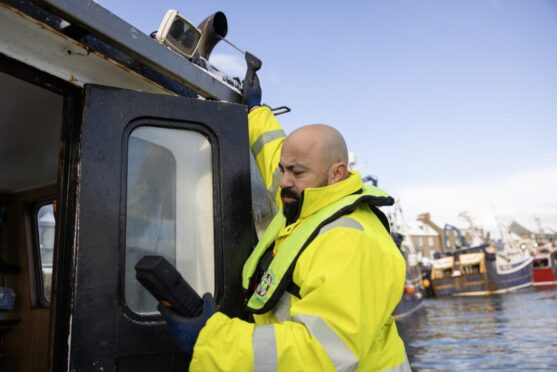Trials of a special fuel treatment on board one of Peterhead Port Authority’s harbour vessels have dramatically reduced its carbon emissions.
-
Some Press and Journal online content is funded by outside parties. The revenue from this helps to sustain our independent news gathering. You will always know if you are reading paid-for material as it will be clearly labelled as “Partnership” on the site and on social media channels.
This can take two different forms.
“Presented by”
This means the content has been paid for and produced by the named advertiser.
“In partnership with”
This means the content has been paid for and approved by the named advertiser but written and edited by our own commercial content team.
Local company Enviroteck deployed an innovative nano-catalyst fuel treatment called CleanBoost to change the behaviour of fuel on the Flying Scud.
Over a nine-week period carbon emissions declined by over 20%. At the same time, the product cleansed the vessel’s engine of old carbon deposits, yielding a much clearer exhaust.
PPA Harbour Master & Director of Port Operations, Ewan Rattray, said: “We have adopted a policy port-wide of substantially reducing our carbon emissions, and decided to stage this trial with the Flying Scud to assess the impact of fuel treatment technology.
“It has been a success not only in cutting emissions but in cleaning the vessel’s engine and saving on fuel costs overall.
“We will now fully assess all the results and consider whether to adopt the technology permanently on this and on our other port-based vessels.”
Treatment helps protect engine
Omar Irvine, of Enviroteck, who conducted the trial, explained that emissions on the Flying Scud rose initially as the proprietary nano catalyst treatment began to clear carbon deposits from within the combustion chamber.
“However, as those were cleared and neutralised, emissions fell back substantially.
“Crucially, unlike many fuel additives, the unique nano catalyst treatment helps protect the engine by increasing lubricity lost with ultra-low-sulphur diesel and the use of additives and can be applied to any combustion engine.
“As well as the combustion chamber, it cleans fuel injectors, intake exhaust valves, fuel filters and tanks, reducing maintenance and servicing costs.
“The cleaner your engine, the lower your emissions, saving on fuel consumption and service costs while increasing power.”
Meanwhile, a net zero strategy is being developed for the Port itself, with baseline carbon emissions being assessed with a view to reducing them. There are already solar panels on the Seagate business complex roof, fish market roof and its adjacent new ice factory, which is designed to use 30% less power per tonne of ice than its predecessor. Electric vehicles are favoured along with LED lighting and shore power for fishing vessels is being upgraded.
Port appoints Reid as new CEO
The port recently welcomed the appointment of a new Chief Executive Officer as it seeks to maximise opportunities in the energy transition while continuing to serve traditional industries such as fishing.
Graeme Reid, formerly a Marine Consultant with the International Maritime Contractors Association (IMCA), has wide and extensive maritime management experience.
Mr Reid, from Newtonhill, Aberdeenshire, said: “I am delighted to have been appointed CEO of Peterhead Port Authority, and I am committed to building on the success the port has had to date with a focus on innovation, collaboration and growth.
“I am excited for the prospects that lie ahead, and together we can leverage our strengths and seize new opportunities to make a meaningful impact in our community and industry.”
Learn more at Peterhead Port Authority’s website.
